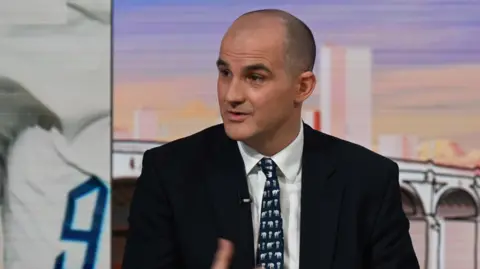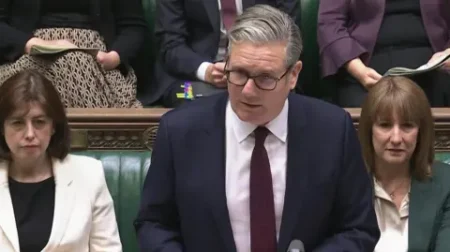In a significant political shift, former Conservative MP and party chairman, Sir Jake Berry, has made headlines by defecting to Reform UK, a party led by Nigel Farage. This move was announced in an article penned by Sir Jake himself for The Sun, where he articulated his frustrations with the existing political system. He stated, “Old Westminster politics has failed. But there’s a better way.” This sentiment reflects his belief that real change stems from challenging the established political order and shaking up a system that isn’t delivering for the people.
In recent days, this departure from the Conservative Party is particularly noteworthy since it is not an isolated incident. Sir Jake’s defection makes him the second former Conservative Cabinet minister to align with Reform UK this week, following ex-Welsh Secretary Sir David Jones, who switched parties earlier in the week. This trend marks an intriguing development within the UK’s political landscape, particularly as it indicates growing discontent among former Conservative representatives.
Sir Jake’s move is historic as he becomes the fourth former Conservative MP to join the ranks of Reform UK. Alongside him, notable names such as Sir David, Ross Thompson, and Anne Marie Morris have also transitioned to this party. Each of these defections signals a substantial shift in loyalty that poses questions about the future of the Conservative Party and its electoral strength going forward.
Having represented the Lancashire constituency of Rossendale and Darwen from 2010 to 2024, Sir Jake’s parliamentary career included significant positions, such as working closely with former Prime Minister Boris Johnson. Throughout his tenure, he served in a variety of influential roles, including in the Cabinet Office and as the Northern Powerhouse minister. His experience within the government contributes to his credibility as he embraces his new political path with Reform UK. Notably, Sir Jake lost his seat during the last general election, which may have catalyzed his move and reassessment of alignment with a party that he now believes fails to address the needs of the electorate.
His statements indicate a clear intention to challenge the status quo. Sir Jake has expressed support for Reform UK’s mission, suggesting that his previous belief in Conservative principles no longer aligns with his perception of necessary political change. This departure provides insights into the broader ideological shifts within the UK political spectrum, raising questions about the effectiveness of traditional parties and their ability to meet contemporary demands.
As the political landscape continues to change, the involvement of figures like Sir Jake Berry in Reform UK might galvanize other dissatisfied Conservative MPs, leading to further realignments. There is a palpable sense of urgency and unrest among constituents that may encourage more politicians to reconsider their affiliations. Furthermore, as they move towards parties that present alternative views, the implications of such defections could heavily influence future elections.
In conclusion, the defection of Sir Jake Berry to Reform UK serves as a lens through which to examine the shifting allegiances within British political life. This episode signifies not just the personal transformation of a seasoned politician, but also reflects a larger movement of discontent within the Conservative Party. With the growing prominence of Reform UK, which champions alternative political ideas, the traditional institutions of power may face pressing challenges as voters seek fresh perspectives and solutions that resonate with their evolving expectations. As such, Sir Jake’s move may well mark a pivotal moment in the ongoing evolution of UK politics.










